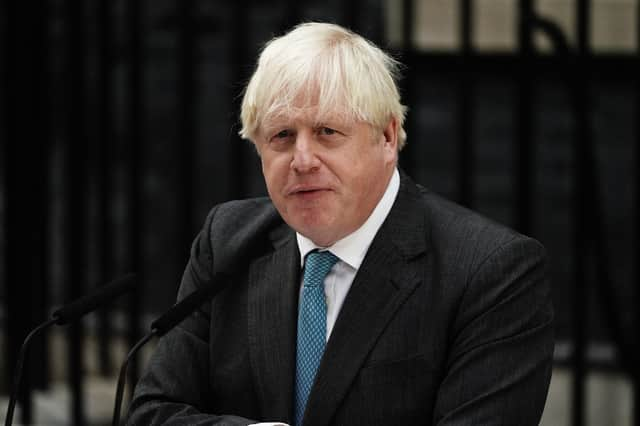Ben Lowry: I am no fan of Boris Johnson but he is right to defend the political power of elected political leaders


We have for years been moving into uncharted political territory. The first move into unusual terrain came in the aftermath of the 1997 Labour landslide, which left the Conservative party so battered that it had three leaders in succession who never made it to Downing Street. Only once prior to that had any Tory leader failed to become prime minister.
But the real turbulence began in 2016, when the country voted for Brexit. In 2017, Jeremy Corbyn shattered the complacent notion that a hard left politician would never become PM. Mr Corbyn did indeed fail to reach that post but he came far closer than anyone predicted, winning 40% of the vote. No Labour leader apart from Tony Blair had done in almost 50 years. Then we had a chaotic run of Conservative leaders and prime ministers – four in five years, one of whom, Liz Truss, lasted days.
Advertisement
Hide AdAdvertisement
Hide AdBut another new thing has emerged in modern British politics, against which Mr Johnson’s resignation is a fierce reaction: we now have institutions that are so powerful they almost rival the power of elected politicians. I think in particular of the courts and the civil service, and the increasing difficulties elected politicians have in changing anything such as reforming education.
One of the most powerful arguments in favour of quitting the European Union (a Brexit which I in fact opposed) was to wrest back control from Brussels bureaucrats, who presided over a growing thicket of directives and regulations to which UK laws were subject. Some weeks ago we published a brilliant speech by the left-wing academic Matt Goodwin (see link below) in which he was scathing about the failure of even the Conservatives to limit the grotesque levels of immigration into the UK as demanded by the public. I particularly liked this line about government weakness in the face of the courts: “They got a party which talked about restoring our judicial independence but then refuses to do the things that would actually allow a supposedly sovereign country to decide, on its own terms, who comes in and who goes out.”
Dr Goodwin was talking about the entirety of the UK, but I can think of no part of the nation so plagued by judicial review, and so constrained in decision making as this province. When we need a Northern Ireland Office that urgently stands up for the right of the UK government to make policy here, either in non devolved matters or in the absence of Stormont, instead we have ministers such as Brandon Lewis and Chris Heaton-Harris, who only ever get tough with unionists, never dare with a party such as Sinn Fein that wants NI to fail, and who instead of – as Tories – taking a reasonably traditional approach to social matters instead actually proudly boast about introducing ultra liberal abortion laws and sex education guidelines which don't even have the safeguards that faith groups are allowed in England (see page 15 of the print edition).
Watch how ultimately weak the government has been amid the deluge of legal challenges over its legacy policy (see link below) despite its belated attempts to rein in lawfare against the security forces.
Advertisement
Hide AdAdvertisement
Hide AdSo I read much of Boris Johnson’s statement with sympathy, even though I am no fan of his, and think that he is among the principal villains in the story of the Irish Sea border. It has, as he says, been extraordinary to see a parliamentary committee try to drive a former prime minister out of parliament. Until now that was unthinkable: ex PMs, however much they were despised by their political enemies, were always granted a certain parliamentary respect in retirement, having served their nation as head of government.
I also think he is justified in citing his mandate, a large parliamentary majority, and to say that his party must not be afraid to be properly conservative on issues that have a mandate. Matt Goodwin was saying the same, and Red Wall voters defected to the Tories for that very reason.
Is Mr Johnson planning to run in the by-election that he has created? He says he is “very sad to be leaving parliament – at least for now”. For all the good things that he did, from his unwavering support for Ukraine to thinking big on infrastructure (albeit being thwarted by the system on his superb plan to close Heathrow and build one of the best airports in the world in the Thames Valley) I would not want to see his return to Downing Street. But we need reminders from time to time that it is elected politicians who have mandates, not unelected officials.
Ben Lowry (@BenLowry2) is News Letter editor